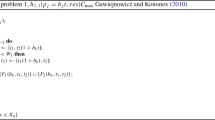Abstract
Process prioritization strategies, based on a probabilistic temporal model, are applied to reduce the number of deadline violations and the tardiness of workflows.
An erratum to this chapter can be found at http://dx.doi.org/10.1007/11915034_125.
Similar content being viewed by others
References
Baggio, G., Wainer, J., Ellis, C.A.: Applying Scheduling Techniques to Minimize the Number of Late Jobs in Workflow Systems. In: Proc. of the 2004 ACM Symposium on Applied Computing (SAC), ACM Press, New York (2004)
Eder, J., Gruber, W., Ninaus, M., Pichler, H.: Personal Scheduling for Workflow Systems. In: van der Aalst, W.M.P., ter Hofstede, A.H.M., Weske, M. (eds.) BPM 2003. LNCS, vol. 2678, Springer, Heidelberg (2003)
Eder, J., Pichler, H.: Duration Histograms for Workflow Systems. In: Proc. of the Conf. on Engineering Information Systems in the Internet Context, Kluwer Academic, Dordrecht (2002)
Eder, J., Pichler, H.: Probabilistic Workflow Management. Technical report, Universität Klagenfurt, Institut für Informatik Systeme (2005)
Rhee, S., Bae, H., Kim, Y.: A Dispatching Rule for Efficient Workflow. Concurrent Engineering, vol. 12. Sage Publications, Thousand Oaks (2004)
Author information
Authors and Affiliations
Editor information
Editors and Affiliations
Rights and permissions
Copyright information
© 2006 Springer-Verlag Berlin Heidelberg
About this paper
Cite this paper
Eder, J., Eichner, H., Pichler, H. (2006). A Probabilistic Approach to Reduce the Number of Deadline Violations and the Tardiness of Workflows. In: Meersman, R., Tari, Z., Herrero, P. (eds) On the Move to Meaningful Internet Systems 2006: OTM 2006 Workshops. OTM 2006. Lecture Notes in Computer Science, vol 4277. Springer, Berlin, Heidelberg. https://doi.org/10.1007/11915034_3
Download citation
DOI: https://doi.org/10.1007/11915034_3
Publisher Name: Springer, Berlin, Heidelberg
Print ISBN: 978-3-540-48269-7
Online ISBN: 978-3-540-48272-7
eBook Packages: Computer ScienceComputer Science (R0)




